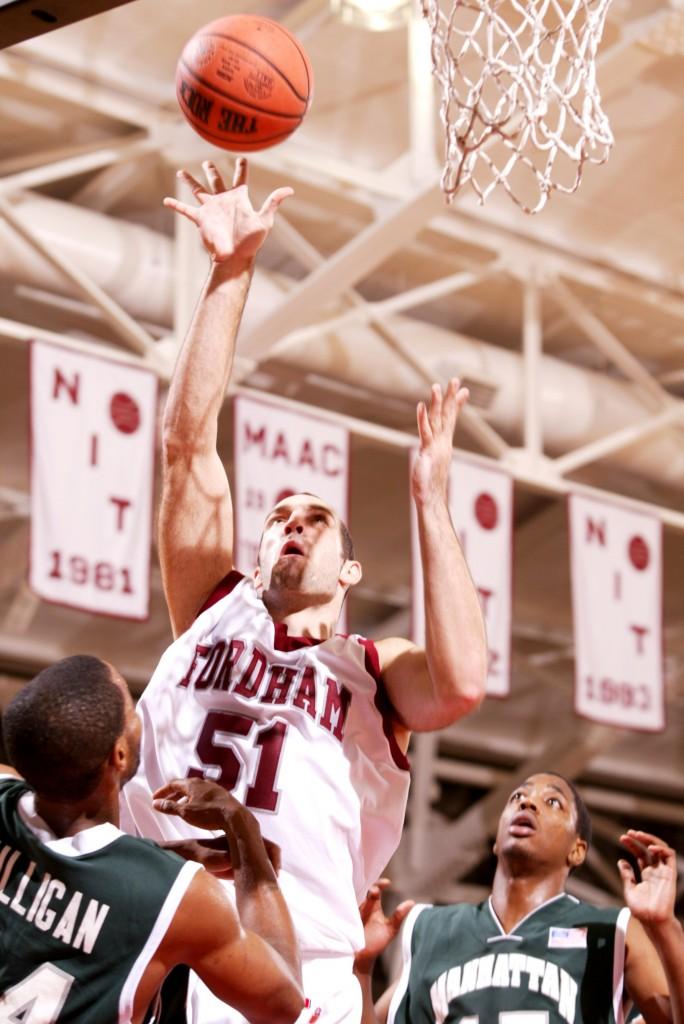Mushon Ya’akosi: From Israel to Rose Hill and Back
July 9, 2011
Published: April 15, 2010
Israeli professional basketball player Mushon Ya’akosi, FCRH ’05, will never forget his playing days here at Fordham. The 6-foot-8 forward/center traveled to America from hometown Raanana, Israel in 2002. In his three-year college career with the Rams, Ya’akosi averaged 5.9 points and 5.7 rebounds per game, leading the 2003-04 team in both field goal percentage and blocks. Now age 29, Ya’akosi has returned to Israel where he plays professional ball for Hapoel Haifa.

The Observer: Were you personally recruited overseas by Fordham or any other American universities?
Mushon Ya’akosi: I was—by Fordham and other schools. I sent over some tapes, got a call, and things rolled from there.
Observer: Why did you ultimately choose to come to America and attend Fordham?
MY: I chose to come to America because I knew the benefits of earning a degree, playing at a high level and learning a different style of play and work ethic. Going to an American college, living in New York and just being a part of a different culture and language was an experience of a lifetime.
Observer: To what extent has the knowledge and style of play you learned at Fordham translated to your career in Israel?
MY: The main thing I took with me from my basketball years at Fordham was self-discipline and work ethic. The level of hard work and discipline was much higher at Fordham than anywhere else, and I kept it with me.
Observer: What’s the general culture of sports in Israel? Are there any sports bars?
MY: The sports culture in Israel is much like that of the sports culture in Europe. Soccer is the number one sport by far, followed by basketball. There aren’t many sports bars. Bars are more for socializing in Israel and less for watching sporting events. The NCAA tournament was televised here and basketball fans did watch, but with the hours’ difference and the lack of knowledge of American college basketball, not a lot of people followed it.
Observer: What nationalities are represented on your team? Do you play in strictly an Israeli league or a European one, as well?
MY: There are four Americans on my team, eight Israelis and no other nationalities. Our team just plays other Israeli teams, but there are some teams in Israel that play in European leagues.
Observer: How have your experiences playing basketball overseas differed from or reminded you of your playing days at Fordham?
MY: I’ve been playing in Israel since my graduation. European basketball is a bit different than college ball. I think the pace of the game is the main difference. Even though we play with a 24-second shot clock, it seems that the pace was much faster when I played at Fordham. The other difference is that in college everybody is almost at the same age and can relate to each other easier, while on a pro team you may have a 32 year old playing on the same team with a 21 year old. That makes the social fabric of the team harder to bring together. But on the other hand, younger players learn from the experience of veteran players.
Observer: Were you in the Israeli armed forces prior to attending Fordham?
MY: I was. Every Israeli man must go into the service for three years when he turns 18. Women must go for two. Because I was a member of the Israeli under-21 national team, I got a desk job instead of going into combat, so I was able to make practices. But I did go through boot camp like everyone else! By the time I got to Fordham, I was already almost 22.”
Observer: Have you personally been affected by ongoing Israeli and Palestinian conflicts?
MY: I was and am affected by the conflicts, just like any other Israeli or Palestinian. It’s not big fun, but it’s been going on for so long that you learn to live with it. The situation has no effect on basketball. We are just so used to it being a part of our lives that we try not to notice it at all.
Observer: How different and/or similar are Israeli stadiums to the Rose Hill Gym?
MY: When it was full, playing at the Rose Hill gym was an amazing experience. It wasn’t usually packed but when the fans were all there and cheering for us, it was the best gym I’ve ever played at.
Observer: Is there any advice you’d like to give the current Fordham men’s basketball program, which went 2-26 this past season and lost its final 21 games?
MY: I know Fordham has very good people in the sports department and I am sure that they are on top of things and don’t need any advice from me. I can just tell them and the fans to keep their heads up! Better years are coming. I’m sure that the basketball program will pick itself up and get to where it should be. I’ll come and watch them play in the NCAA tourney – just don’t make me wait too long.









